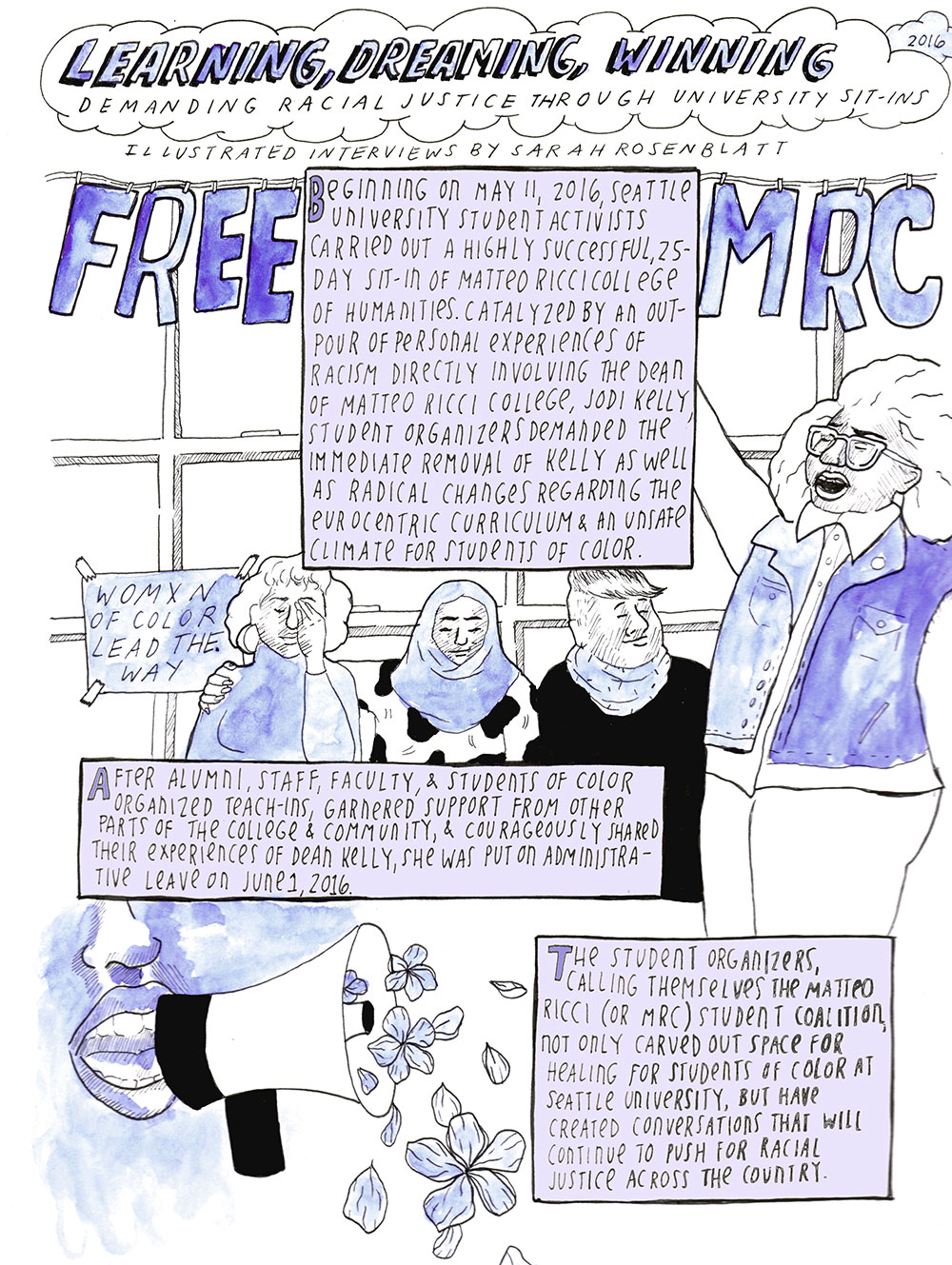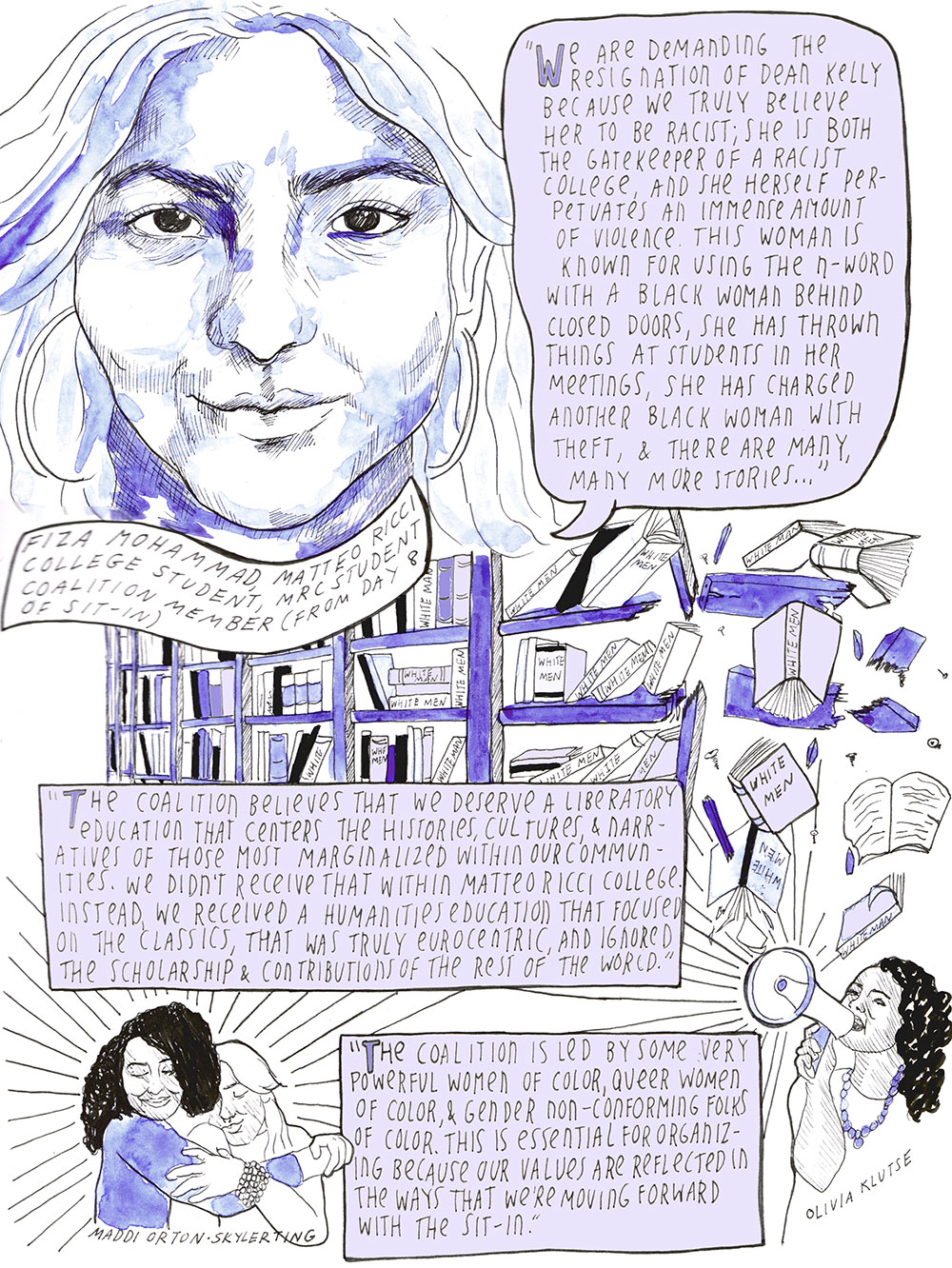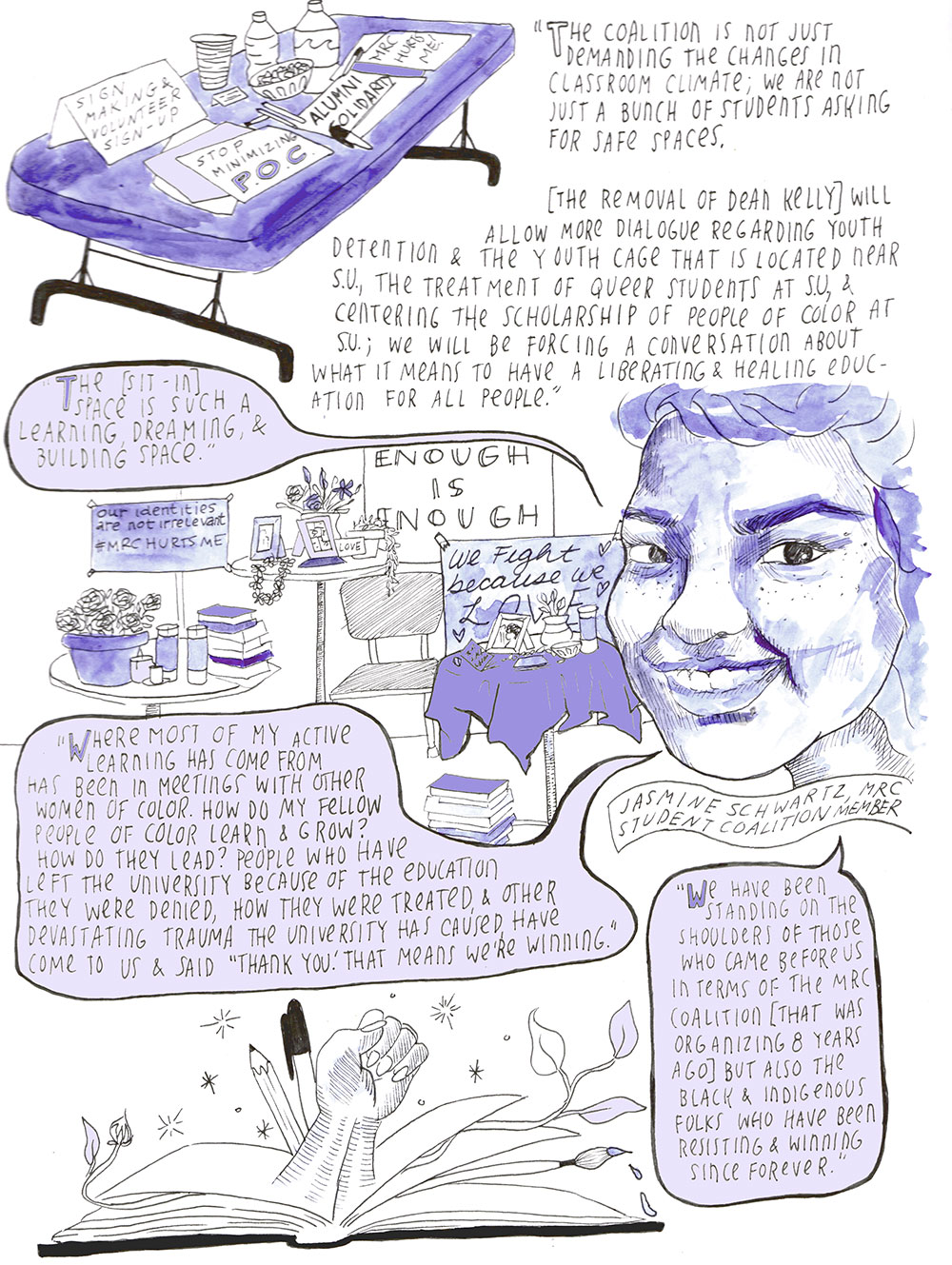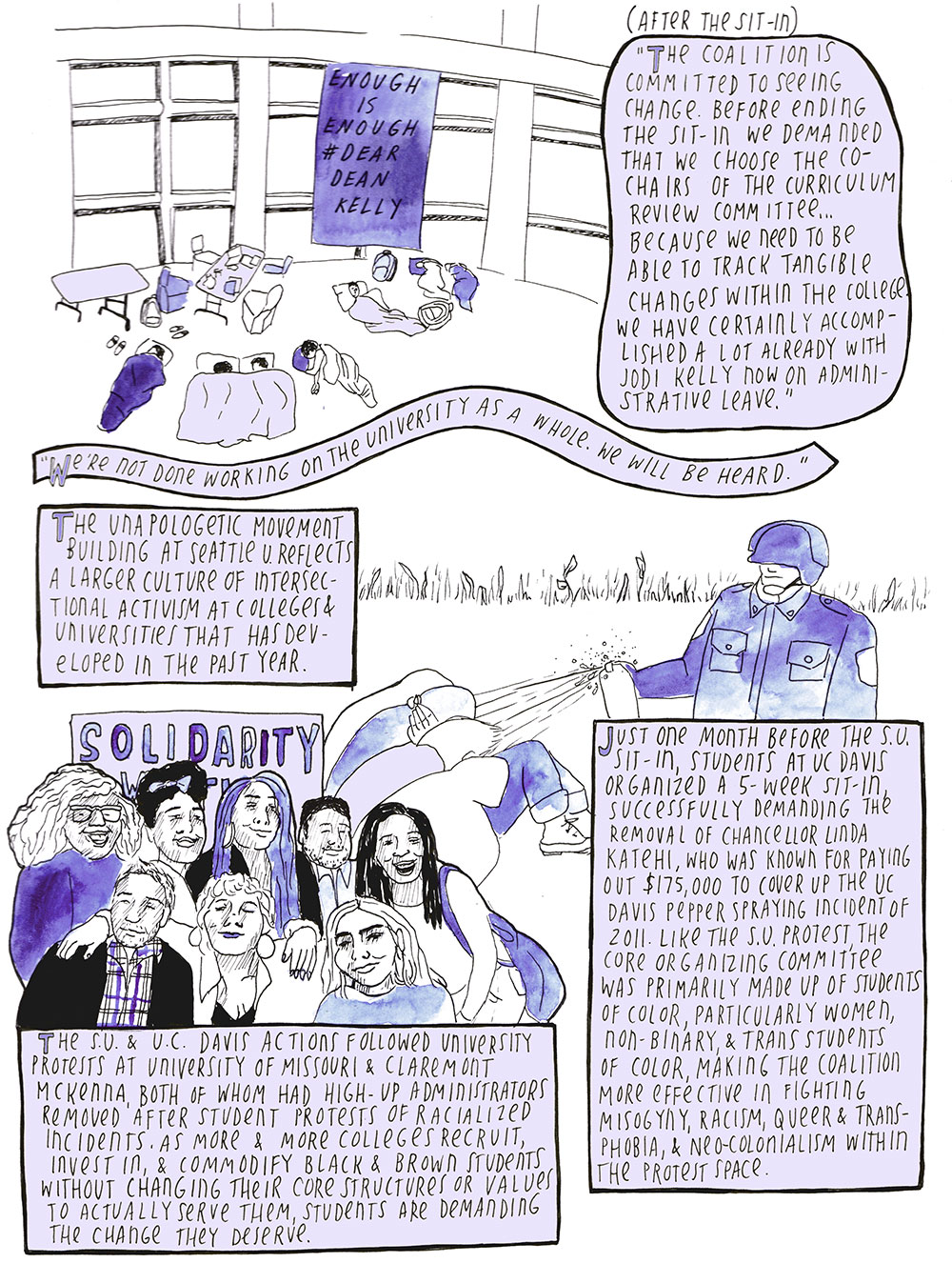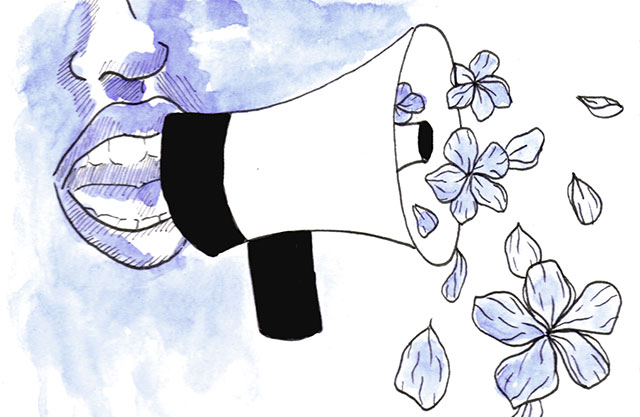 (Image: Sarah Rosenblatt)
(Image: Sarah Rosenblatt)
Click a page to view full-size in a new window.
Beginning on May 11, 2016, Seattle University (SU) student activists carried out a highly successful 25-day sit-in at the Matteo Ricci College of Humanities. Catalyzed by an outpouring of personal experiences of racism directly involving the dean of Mateo Ricci, Jodi Kelly, student organizers demanded her immediate removal from the administration, as well as radical changes to the college’s Eurocentric curriculum and an unsafe climate for students of color. After alumni, staff, faculty, and students of color organized teach-ins and events, garnered support from other parts of the college and community, and courageously shared their experiences of Dean Kelly, she was put on administrative leave on June 1, 2016. Following a long tradition of student activism on college campuses, the organizers, calling themselves the Mateo Ricci College (MRC) Student Coalition, not only carved out space for healing for students of color at Seattle University, but also created conversations that will continue to push for racial justice in academic institutions across the country.
Fiza Mohammad, MRC Student Coalition member (Day 8 of the Sit-In)
“We’re demanding the resignation of Dean Kelly because we truly believe her to be racist. She is both the gatekeeper of a racist college, Mateo Ricci College and she herself perpetuates an immense amount of violence. This woman is known for using the n-word behind closed doors with a Black woman, she has thrown things at students in her meetings, she has charged another Black woman with theft, and there are many, many more stories… The coalition believes that we — queer students, students, women of color, white students — deserve a liberatory education that centers the histories, cultures and narratives of those most marginalized within our communities. We didn’t receive that within Matteo Ricci College. Instead, what we received was a humanities education that focused on the classics, that was truly Eurocentric and ignored the scholarship, intellect and contributions of the rest of the world. Many of our Black, Brown, immigrant and working class parents sent us into these institutions of higher education because they believed an education would be equalizing. This is not the case at all [at] Seattle University and Mateo Ricci College in particular.
The coalition is led by some very powerful women of color, queer women of color, and gender nonconforming folks of color. We believe that this is essential for organizing because our values are reflected in the ways that we’re moving forward with the occupation. Much of the narrative about the coalition (that has been shaped by the media and the administration)… is that we are either college idealists who are trying to create a utopian society, or we are just a bunch of aggressive, emotional women of color who don’t know what we’re doing, who need to get deported, or should have never come to a Jesuit university. To all these people, I hope you find some healing.
The coalition is not just demanding the changes in classroom climate; we are not just a bunch of students asking for safe spaces. We recognize the trauma that has been inflicted by interactions with Dean Kelly and other professors within Matteo Ricci College (and throughout Seattle University). The mission of Seattle University is to empower students for a just and humane world. The coalition believes and knows that the world is not just and humane — it is harmed and broken by a history of colonization and imperialism and is a truly racist and sexist world. Many of us believe that our teachers have not prepared us to live in a broken world. We deserved teachers who knew how to teach us as Black and Brown students and knew how to engage white students with their own whiteness.
I would encourage all those who are not a part of Seattle University or Matteo Ricci College, or even those who don’t empathize with our cause, to see the connection between what we’re asking for and a more liberated and healed world. The fact that it’s so difficult for us to enact something like this, which is something we deserve as Black and Brown students, is reflective of both the racism embedded within Seattle University and Seattle as a city. This is not just about Dean Kelly. We know that with our organizing on this campus we’ve already created, demanded, and forced a space for the types of conversations we deserve to be having. We believe that by demanding the immediate removal of a racist dean, we will be forcing a conversation within SU and hopefully, within the city, about what it means to have a liberating and healing education for all people.”
Jasmine Schwartz, MRC Student Coalition member
“The [sit-in] space is a learning, dreaming and building space. We have several altars with books that we’ve all brought from our homes to the space and it’s been there for us to access whenever we can. There are books of poetry and other intellectual scholarship texts to learn from. Where most of my active learning has come from has been in meetings with other women of color. How do my fellow people of color learn and grow? How do they lead? How do they decide what’s right for them?
People who have left the university because of the education they were denied, because of how they were treated, and other really devastating trauma the university caused, have come to us and said “thank you.” That means we’re winning. Seeing the administration squirm in their seats, feel threatened by our power — that means we’re winning. Our work is just beginning now. We have so much community support. We have so much love from Seattle Pacific University especially. They came as individuals to support us, scheme with us, learn from us and with us. So many organizations and people have shown up for us. We always talk about the coalition that was organizing eight years ago at MRC. They have so much documentation that has been vital to our movement. We are standing on the shoulders of those who came before us in the MRC coalition, and also of the Black folks and indigenous folks who have been resisting and winning since forever. We use their models of pressure and resistance and strategy in everything we do.
(After the Sit-In)
The coalition is committed to seeing change. Before ending the sit-in we demanded that we choose the co-chairs, as well as several key members of the curriculum review committee. The reason is because we need to be able to track tangible changes within the college. Having two coalition members on the committee allows the coalition to be represented. We have certainly accomplished a lot already with Jodi Kelly now on administrative leave. It opens the door for real change to occur.
We also demanded a change to the physical space before we would leave it. The reason is to break the violent atmosphere that has been the norm for so long in that space. This change included, but was not limited to, hanging a framed group photo of the coalition with a description of what we accomplished and who we are. We have had a deep impact and anyone who walks into the office should know about it. Specifically, in the future, when other Brown and Black students walk into the space, they know they aren’t alone. A student who feels unsatisfied or betrayed by their education [will know] that it is possible for them to do something about it; they don’t have to sit in silence. By showing our faces to future students we are also preparing ourselves to have others stand on our shoulders. We aren’t finished with the work we have begun this year. We are excited to continue working on Matteo Ricci College. There also are so many students still in the middle of their college career all across [the SU] campus. We’re not done working on the university as a whole. We will be heard.”
The unapologetic movement building at Seattle University reflects a larger culture of intersectional activism at colleges and universities that has developed in the past year. Just one month before the SU sit in, students at UC Davis organized a five-week sit-in, successfully demanding the removal of Chancellor Linda Katehi, who was known for paying out $175,000 to cover up the UC Davis pepper spraying incident of 2011. Students involved in the sit-in also exposed her positions on private corporate boards, such as for-profit DeVry University and a textbook company, as well as her inadequate response to anti-Black and Islamophobic hate crimes on campus. Like the SU protest, the core organizing committee of the UC Davis sit-in was primarily made up of students of color, particularly women, non-binary, and trans students of color, making the coalition more effective in fighting misogyny, racism, queer and trans phobia, and neo-colonialism within the protest space.
The SU and UC Davis actions followed similar protests at University of Missouri and Claremont McKenna over racialized incidents, resulting in high-up administrators being removed at both schools. As more and more colleges recruit, invest in, and commodify Black and Brown students without changing their core structures or values to actually serve them, students are demanding the change they deserve and are learning from one another, as well as from non-academic grassroots movements like Black Lives Matter, Idle No More, and Not One More.
We have 10 days to raise $50,000 — we’re counting on your support!
For those who care about justice, liberation and even the very survival of our species, we must remember our power to take action.
We won’t pretend it’s the only thing you can or should do, but one small step is to pitch in to support Truthout — as one of the last remaining truly independent, nonprofit, reader-funded news platforms, your gift will help keep the facts flowing freely.
